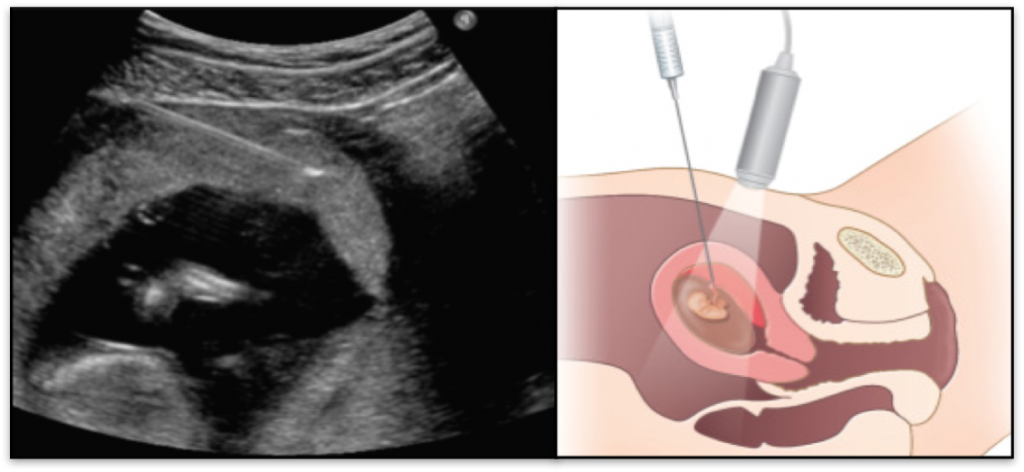Invasive Procedures
Fetal Reduction in Pune - Invasive Procedures
Ultrasound guided diagnostic/therapeutic procedures
In cases where the risk of chromosomal abnormality is high based on first & the second trimester screening or for pregnancies at a high risk for genetic abnormalities, an invasive diagnostic test is performed. It may be Chorionic Villous Sampling (CVS) (between 11-13+6 weeks) or Amniocentesis (after 16 weeks).
A therapeutic procedure is performed in case of higher order multi-fetal pregnancies(elective fetal reduction), fetalanemia (Intrauterine Fetal Blood transfusion), complicated twin pregnancies (Laser ablations, cord coagulation, selective fetal reduction, etc). Fetal reduction procedures for multifetal pregnancies are always performed after performing the NT scan which includes aneuploidy screening as well as thorough evaluation of fetal anatomy.

What are the diagnostic procedures in fetal medicine?
Following are the different diagnostic procedures,
- Amniocentesis
- Chorionic Villus Sampling (CVS )
- Fetal blood test assortment (Cordocentesis)
Amniocentesis:
During amniocentesis, a little sample of amniotic (fluid encompassing the baby during the pregnancy) is acquired and is tested in a research center or a laboratory. Amniotic fluid contains fetal cells and tissues alongside different enzymes, proteins, hormones, and substances of diagnostic value.
Amniocentesis is advised to pregnant women for an assortment of reasons. It is done following 15 weeks of pregnancy. A few conditions where amniocentesis is suggested are:
- For analysis of fetal disease.
- For waste of unnecessary amniotic liquid in conditions, for example, polyhydramnios.
- There is a past filled with hereditary issues in past pregnancies or the guardians are known carriers of a hereditary transformation.
- When there is a high risk for chromosomal in the baby as shown during routine prenatal screening.
- Structural deformities in the baby.
Chorionic Villus Sampling (CVS):
In this test, a sample of chorionic villi is taken from the placenta and is inspected for peculiarities. It is normally done following 11 weeks of pregnancy.
Circumstances that brief the CVS test are:
- History of hereditary problems in past baby thalassemia, muscular dystrophies, or different conditions identified with worldwide development delay and you need to preclude it in the current pregnancy or guardians are carriers of a hereditary change.
- Structural contortions in the baby
- If the consequences of the first-trimester screen show a high risk for chromosomal issues as down syndrome.
Fetal Blood Sample Collection/Cordocentesis:
Fetal Blood Sampling is a test where we take a small quantity of fetal blood from the umbilical cord and test it for diagnosis and treatment of fetal anomalies. It very well may be done whenever during the pregnancy following 18 weeks of the development period.
Fetal blood sampling test is done for an assortment of reasons, for example,
- For diagnosis and treatment of serious anemia in the baby.
- Detection of Chromosomal/Genetic Anomalies.
- To give certain medication to the baby for any current conditions.
- Detection of metabolite levels, hormones, platelets.
- For detection of for presence of any diseases.
What is the risk associated with diagnostic invasive procedures?
Diagnostic Procedures are generally safe. In any case, there is a small possibility of inconveniences with amniocentesis and CVS as, miscarriage (2-4 in a 1000), preterm spilling (<1 in a 100) spots, and infection. The risk of fetal misfortune is higher with fetal blood sampling (1-2 %).
What are therapeutic/surgical procedures used in Fetal Reduction?
There is an entire list of mediations that are possible to treat just a few conditions while the baby is inside so the chances of survival of the baby, when conceived, improve. The conversation of these procedures is past the extent of this forum; however, it is reasonable to name them
- Fetal reduction is diminishing the number of embryos inside when there are more than two or one is abnormal.
- Fetal bonding of blood while the baby is as yet inside the womb in case it is seriously anemic.
- Laser removal of blood channels between twins sharing a single placenta in case there is an imbalance of liquid between the twins.
- Different techniques to seal the blood supply of vascular tumors of the embryo or placenta.
- Draining fluid out of around the lungs
- Certain fetal medical procedures are performed in exceptionally specialized centers.
With these advances in fetal medication, the possible outcomes of working on the result of pregnancy are increasing step by step, to guarantee cheerful parenthood and adolescence for yourself as well as your baby is individual.
Why Choose Dr. Saket Thakar?
Dr. Saket Thakar is one of the most experienced fetal medicine specialists who perform the Fetal Reduction in Pune. He performs invasive procedures that recognize the problems that a baby may have during pregnancy with the help of various scans.
